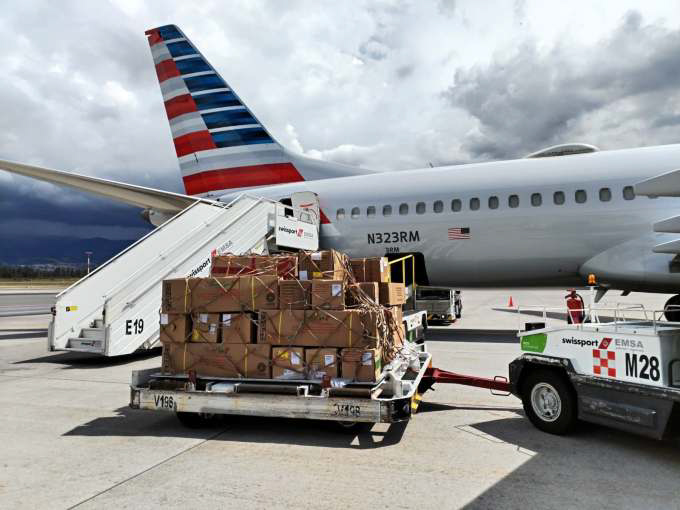American Airlines Cargo: The making of a global cargo leader
In recent years, American took the most extensive fleet renewal effort in the history of commercial aviation, giving it the youngest mainline fuel-efficient fleet among major US network carriers. The airline expects to receive deliveries of newer aircraft still on order in the coming years which includes 30 widebody Boeing 787s.
The air cargo industry’s vast operations involve intricate planning, innovations, highly skilled workforce and huge investments. And American Airlines Cargo has what it takes to become a dominant force in the industry, bridging the gap between businesses and continents.
With its daily cargo flights connecting major cities across the globe, from the United States to Asia, Europe, and beyond, American Airlines Cargo has established itself as a trusted partner for shipping everything from life-saving pharmaceuticals to e-commerce packages.
American Airlines, the parent company to American Airlines Cargo, was founded in 1930, emerging from a consolidation of around 80 small airlines. Though cargo wasn’t a primary focus for the airline in its early days. It mainly concentrated on building its passenger network, gradually expanding its reach across the United States.
American Airlines soon recognized the potential of cargo transportation and began to invest in its capabilities.
By the mid-1930s, the airline had started carrying small packages and mail, marking the inception of its cargo operations.
Reflecting on his career spanning over two decades in the aviation industry, Sam Mendenhall brings in a wealth of experience that began with US Airways in 1999, later merging into American Airlines in 2013.
His journey through roles such as Controller of Financial Planning and Managing Director of Crew Scheduling culminated in his current position as VP of Operations for American Airlines Cargo in 2020.
Sam’s tenure at Cargo coincided with unprecedented challenges, including the global COVID-19 pandemic and a transformative digital overhaul within the industry. These experiences underscored the importance of adaptability and innovation in crisis management.
Leveraging digital advancements and strong industry relationships, American Airlines Cargo navigated the pandemic with resilience.
From implementing cargo-only flights to fostering collaborative teamwork across their global network.
As the industry evolves, Sam remains committed to driving forward innovation and operational excellence, ensuring American Airlines Cargo continues to deliver exceptional service amidst a changing landscape.
In this exclusive interview with Air Cargo Update, Mendenhall shares insights into how American Airlines Cargo has navigated crises, expanded service capabilities, and enhanced customer experiences.
From the Priority Parcel Service (PPS) ensuring swift deliveries of small parcels to the MEDEVAC service facilitating urgent medical shipments, Mendenhall highlights the airline’s commitment to operational excellence and customer care.
The Speed Advantage
According to American Airlines Cargo, Priority Parcel Service or PPS is the key to its swift deliveries.
With PPS, you choose from a variety of services that cater to your specific needs, including same-day, next-day, and two-day delivery options. This means you can get your packages delivered quickly, without compromising on reliability or affordability.
Shipping time-sensitive packages can be a daunting task, especially when you’re dealing with perishable goods, medical supplies, or critical business documents.
That’s why PPS offers a range of specialized services, including expedited shipping, real-time tracking, and dedicated customer support.
“Our Priority Parcel Service (PPS) is designed to give small parcel shipments the highest priority possible. PPS gets shipments with a maximum weight of 100 lbs and 90 total inches in size onto the next flight out from more than 150 stations around our network,” Mendenhall explains.
“Customers can either book in advance or simply visit one of our PPS facilities with the shipment before the next flight’s cutoff time. Common examples of what we can move using our PPS product includes things like pets, perishables, personal items, and important documents.”
Time-Sensitive Care
American Airlines Cargo’s MEDEVAC service is a critical lifeline that relies on seamless coordination with air traffic control to deliver time-sensitive care.
In emergency situations, every second counts, and American Airlines Cargo MEDEVAC services bridge the gap between patients and medical facilities, ensuring they receive the care they need in a timely manner.
The MEDEVAC service offered by American Airlines Cargo is a highly specialized and customizable solution for medical transportation.
With a fleet of dedicated aircraft and a team of experienced professionals, this service accommodates a wide range of medical requirements, from basic life support to advanced critical care.
“MEDEVAC is a domestic service American Airlines provides in conjunction with air traffic control for time-critical, life-saving medical emergency and organ shipments. Customers can request MEDEVAC service at least two hours in advance of flight.
Our teams create an air waybill and make the necessary arrangements with air traffic control,” said Mendenhall.
“The aircraft then receives a special MEDEVAC designation, and the flight is granted the most direct flight path to the destination in addition to receiving a higher landing priority. We often transport things like organs for transplant, cord blood, and corneas, and are proud of the small role we play in helping others,” he added.
Perishable Handling
Pharmaceutical products are often irreplaceable, high-value, and extremely time-sensitive.
A single misstep in transportation can have devastating consequences, making it imperative to choose a logistics partner that understands the intricacies of pharmaceutical handling.
Temperature fluctuations, exposure to light, or physical damage to name a few renders life-saving medications ineffective or even harmful to patients.
American Airlines Cargo’s ExpediteTC services is a specialized solution designed to provide a secure, reliable, and expedited transportation process for your critical shipments.
The ExpediteTC services offer a tailored approach to pharmaceutical shipping.
With features like dedicated customer support, real-time tracking, and temperature control, you can trust that your valuable cargo is in good hands.
The robust infrastructure supporting ExpediteTC services ensures that your shipments are handled with the utmost care.
From the initial booking to final delivery, American Airlines Cargo’s team of experts works closely with customers to guarantee a seamless and efficient experience.
“ExpediteTC is our temperature-sensitive solution, often utilized for life-sciences commodities like pharmaceuticals. We offer an array of active-controlled ULD containers from various vendors based on the level of temperature and consistency a customer might need. We also offer a passive option for temperature sensitive shipments where customers can pre-pack their shipments with cold packs or dry ice, which are then handled by our trained teams to ensure their integrity,” Mendenhall highlights.
“Across our major stations, we have a variety of room temperature (CRT), refrigerated (COL) or frozen (FRO) spaces to protect critical pharmaceutical products when they are at our facilities along their journey. We are proud to be CEIV PHARMA certified at our Headquarters, DFW, MIA and PHL locations, with plans to expanded that to certification to additional hubs.”
In March 2024, American Airlines Cargo became a key player in transporting prized Nishikigoi, or decorative koi carp, from Japan to destinations worldwide. These ornamental fish, revered for their beauty and symbolic value of wealth, require specialized handling and care during air travel.
With some specimens valued up to US$2 million each, they are transported mainly from Niigata Prefecture, Japan’s hub for koi breeding.
The airline has seen a significant rise in koi shipments over the past two decades, driven by global demand from collectors and ornamental fish enthusiasts.
In 2023, the airline transported record volumes of over 19,100 kilograms to LAX and 9,600 kilograms to DFW alone, highlighting its role in facilitating the global trade of these exquisite aquatic treasures.
Saying ‘NO’ to Wildlife Trafficking
American Airlines Cargo announced in 2023 that it has joined United for Wildlife, a group dedicated to ending the illegal trafficking of wildlife, as first reported in the airline’s 2022 Sustainability Report.
American signed the Buckingham Palace Declaration in December 2022, making it the first US airline and cargo carrier to join the organization.
United for Wildlife was founded by Prince William and The Royal Foundation in 2014 to protect endangered species from illegal trade.
As a member of the Transport Taskforce and the North American Chapter, American plays a vital role in stopping the illegal trafficking of wildlife by preventing these products from being transported across borders.
Together with other players along the supply chain and regional partners from various sectors, American Airlines Cargo is part of a critical network of stakeholders trained to recognize patterns of illegal wildlife trade where it is most prevalent.
“American joined United for Wildlife in December 2022, and we were the first U.S. airline to join and remain the group’s only U.S. passenger airline. Since joining, we have made wildlife awareness training a requirement for frontline Cargo team members and created communications materials designed to educate staff on wildlife smuggling. We also developed new channels for reporting suspicious incidents. We plan to expand this work in 2024 and look forward to deepening our partnership with United for Wildlife,” said Mendenhall.
Industry-Wide Sustainability Focus
One of the earliest signs of American Airlines Cargo’s commitment to sustainability dates back to the 1990s, when the airline began exploring ways to reduce fuel consumption and emissions.
This pioneering spirit laid the groundwork for future initiatives, demonstrating the airline’s willingness to take proactive steps towards a more environmentally friendly operation.
As an airline, it has set milestones along the way for achieving net zero emissions by 2050. These efforts include: Replacing 10% of jet fuel with SAF by 2030; Reducing GHG emissions intensity by 45% by 2035, and; by Targeting net zero emissions by 2050.
In recent years, American has undertaken the most extensive fleet renewal effort in the history of commercial aviation, which gives it the youngest mainline fleet of any major US network carrier and improves fuel efficiency. The airline expects to receive deliveries of newer aircraft still on order in the coming years, including 30 widebody Boeing 787s.
“In addition to SAF, we are also supporting sustainable alternative fuel initiatives through strategic partnerships. For example, one way we’re trying to help is by funding project companies utilizing emerging climate technologies through our partnership with Breakthrough Energy Catalyst,” said Mendenhall.
Adding, “American has finalized an offtake agreement with Infinium, a producer of next-generation low-carbon jet fuel, which signifies our long-term commitment to purchase the fuel and will help support its long-term production. American also became the first customer of Graphyte’s innovative and permanent carbon removal process and has worked with partners to conduct important contrail avoidance research.
“Specific to Cargo, we announced at the beginning of the year that in 2023 we reduced our long-term plastic waste by the equivalent of 8.6 million plastic water bottles. This achievement is thanks to our collaboration with BioNatur Plastics, whose plastic products bio-degrade in natural landfill conditions in 8-12 years, rather than the 1,000 years for regular plastic.”
The airline has achieved a significant milestone in sustainability by reducing long-term plastic waste by over 150,000 pounds in 2023.
This accomplishment, equivalent to eliminating 8.6 million water bottles, was made possible through their partnership with BioNatur Plastics™ from M&G Packaging.
Starting at major U.S. hubs in 2022, American Airlines began using BioNatur Plastics products, cutting plastic waste equivalent to 6.4 million water bottles in the first year alone.
By 2023, American expanded the use of these biodegradable products to regional US stations like Detroit Metropolitan Airport (DTW), Honolulu International Airport (HNL), and Minneapolis-Saint Paul International Airport (MSP), as well as internationally to airports in Latin America such as Carrasco International Airport (MVD) and Santiago International Airport (SCL). This initiative underscores American Airlines’ commitment to sustainable air cargo operations.
What’s more? Recently, American Airlines Cargo announced that it has forged a strategic partnership with CargoAi, a leading digital platform in the air cargo industry.
This collaboration aims to enhance the airfreight booking experience on CargoMART, CargoAi’s advanced freight management platform.
By integrating into CargoMART, American Airlines Cargo will expand its network visibility and simplify booking processes for freight forwarders.
This partnership leverages CargoMART’s technology alongside American’s own digital booking platform, aacargo.com, to provide customers with seamless access to a wider range of routes and improved booking management capabilities.
American also announced its 2024 summer schedule with new routes and expanded services for 2024.
Fresh connections from Europe, like Barcelona-El Prat Airport (BCN) to Dallas/Fort Worth International Airport (DFW), Copenhagen Airport (CPH) and Nice Côte d’Azur Airport (NCE) to Philadelphia International Airport (PHL), and Venice Marco Polo Airport (VCE) to Chicago O’Hare International Airport (ORD). Some of these routes began in April and will continue through October.
Summer routes year-round, including BCN to PHL, Lisbon Airport (LIS) to PHL, and Madrid-Barajas Airport (MAD) to CLT, providing consistent service beyond the summer months.
Across the Pacific, American Airlines is introducing new flights from Haneda Airport (HND) to John F. Kennedy International Airport (JFK) and increasing daily flights from Shanghai Pudong International Airport (PVG) to DFW.
Domestically, Americans’ widebody network from its hub at DFW connects major U.S. destinations like MIA, ORD, and PHL, ensuring ample capacity for large freight shipments throughout the summer season.














